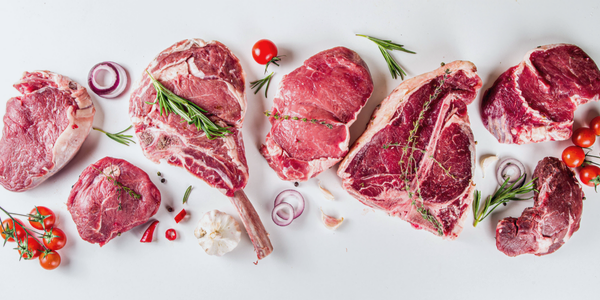
Nutrition misinformation runs rampant in the media, making it easy to commit classic weight loss mistakes.
Even common adages, like “move more, eat less,” can lead you in the wrong direction. Identifying myths can help you get closer to the truth, empowering you to progress on your weight loss journey.
Continue reading for common diet mistakes, including the worst weight loss myths and mistakes that can harm your health over time.
Mistake #1: Not Eating Enough
Even though weight is a complex facet of health, a singular piece of “just stay in a calorie deficit” is often offered. Although this is often an oversimplified approach, people embrace it whole-heartedly by cutting calorie intake severely and over-exercising.
Just because calorie restriction diets and methods can be effective does not mean they are free of side effects. Not eating enough may cause a drop in weight but may have profound effects on mental health, libido, and your body’s ability to regulate body temperature. Very low-calorie diets can be dangerous, not only in terms of nutrition but also for overall health.
Although limiting calories to lose weight is tempting, dietitians recommend meeting your daily calorie intake by eating various nutrient-rich foods. The number of calories you need may vary by age and life stage.
Mistake #2: Cutting Out Entire Food Groups
Another alluring option for dieters is to cut out an entire food group. According to the media, the culprit has changed throughout the decades. Everything from fats to carbs to dairy has been implicated as the cause of weight gain.
The truth is that nutrition plans often work best when personalized to an individual's unique needs. Depending on your health status or disease state, reducing your intake of certain foods may be helpful. However, this should always be done under medical supervision or the supervision of a dietitian.
Many people cut out foods with gluten, dairy, or animal byproducts simply because they’ve heard it might help them lose weight faster. While this method may work for weight loss in the short term, it can raise your risk for nutrient deficiencies and other health problems in the long term.
Instead of avoiding fats or carbs altogether, consider switching to more nutrient-rich forms of foods you already know, love, and use regularly. For example, trade saturated fats for healthy fats—like olive oil, avocados, nuts, and seeds—and refined grains for healthy whole grains—like ancient grains, oats, quinoa, and brown rice.
Mistake #3: Overdoing Cardio
To increase physical activity, people create one of the most common weight loss blunders: focusing too much on cardio and not enough on strength. Cardio exercise, including aerobic exercises like walking and jogging, can cause a calorie burn. However, studies show that strength exercises go the extra mile to help build muscle mass, fortify bones, and generally favorably alter body composition.
Like your nutrition plan shouldn’t solely focus on reducing body weight as the only sign of success, your exercise and weight loss program shouldn’t limit your movement patterns to what will burn calories the fastest. A well-rounded program often includes cardio and strength exercises for optimal overall health. Plus, alternating between cardio and strength activities can create more variety in your exercise routine.
Mistake #4: Self-Sabotaging
One of the more sneaky ways to sidetrack your diet is through self-sabotage. This often happens when your goals don’t align with your eating habits.
For example, you may aim to eat healthy but stock your pantry with plenty of processed foods and snacks with added sugars. Or, maybe you’re making good food choices but skip meals or eat inappropriate portions. You could be eating well and exercising, but don’t prioritize proper sleep or stress management.
There are many ways to sabotage yourself, especially if you’re thinking the short term and not considering long-term health or adjusting your daily habits appropriately. Instead of being fearful of distractions and potential mistakes, it can help to acknowledge where you’re falling short, focus on making small but significant changes, and then move forward by implementing healthier habits. Of course, this is easier said than done, but your new healthy habits will become second nature over time!
You may feel like you have to sacrifice your favorite foods to eat healthy, but this is simply untrue. It may require an adjustment, but plenty of nutritious, delicious, and flavorful healthy foods exist.
Keeping foods like fresh fruits, low-fat cheese, nuts and seeds stocked in the fridge or pantry can help you stay satiated and stay on track with your goals. Additionally, experimenting with spices can take you out of your comfort zone.
Mistake #5: Only Focusing on the Scale
People focus too much on the scale and not enough on how their health status makes them feel. If your current weight loss plan is causing the number on the scale to go down and negatively affecting your relationship with your food (and yourself), it isn’t worth pursuing.
A healthy weight loss plan should allow you to focus on metrics beyond weight measurements. These are often called non-scale victories because they are little wins that have nothing to do with the number of pounds going down.
For example, do you feel more comfortable in your clothing? Has your sense of self-worth improved? Have your energy levels increased since making positive changes? Have you been able to keep up more easily with your home or work life? These can all be progress indicators that the scale cannot measure.
Mistake #6: Doing It All on Your Own
Many individuals believe eating healthy is a solo effort. Just like you may want to order a house cleaner occasionally to maintain a clean house, you may want to hire someone to help you with your nutrition plan. Some dietitians accept or work with insurance, making the process even more affordable.
In addition to making your weight loss journey a team effort, you can also make it a family affair! Research shows that sharing meals can promote better nutritional health for the kids.
If you’re feeling overwhelmed when planning weight loss-friendly meals, remember there’s no shame in asking for help. Don’t feel guilty for opting for easy meals (like crockpot meals or smoothie kits) or using a meal delivery system.
If you’re interested in an easy meal solution, bistroMD provides delicious, whole-food meals for weight loss. Doctors and dietitians have vetted them, so you won’t have to worry about meeting your nutritional needs.
Weight Loss & Diet Mistakes: Final Thoughts
The bottom line is that no one is 100% perfect following a weight loss plan. Everyone makes mistakes and can be duped by dubious weight loss methods.
Learning to be better each day helps you stay aware of scams, and reaching out to a dietitian makes meeting your nutritional needs easier.







